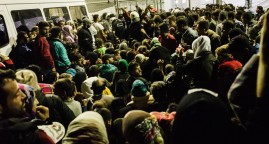UNHCR’s proposals to help stabilize the situation of refugees
While the vast majority of the world’s 60 million displaced are hosted in the developing world, increasing numbers have undertaken perilous journeys to Europe, with over one million having crossed the Mediterranean to Europe since the beginning of 2015.
An urgent adjustment of political and humanitarian priorities is needed to meet these new realities.
First and foremost, greater efforts are required to resolve the conflicts that lead to displacement. In the absence of political solutions, the countries that host the vast majority of refugees need support. The international conference on Supporting Syria and the Region in London on 4 February 2016 was significant, as the international community pledged more than USD 11 billion to fund activities that can have a stabilizing effect for refugees and their host communities in the region.
UNHCR is ready to assist in the implementation of activities under this funding arrangement to address needs already identified and to achieve early improvements in livelihoods and education. Similar initiatives would be important to benefit also Iraqi and Afghan refugees, including those born in Pakistan or Iran. Emergencies in Africa, which remain underfunded, must not be forgotten. Concerted efforts are required now to implement in practice and in a “packaged approach“ the outcomes of the Valletta Summit on Migration and to focus on these acute needs.
At the same time, more efficient management of the situation within Europe is urgently needed. The majority of European States have not been directly affected by the present situation. However, the participation of these States in a collective solution is critical to managing it effectively. The collective failure to implement the measures agreed by EU Member States in the past has led to the current escalation in the crisis. A reinvigorated approach is needed.
The 6 following proposals set out recommendations for how to achieve this in a spirit of solidarity, restoration of trust among States, and responsibility sharing.
- Implement the hotspot approach and the relocation schemes
- Support the emergency response in Greece
- Improve compliance with the EU Asylum Acquis
- Expand opportunities for resettlement and other pathways for admission
- Develop protection safeguards for individuals at risk
- Develop effective European systems for allocating responsibility for asylum-seekers in the mid-term
Read the UNCH complete proposals
Related Articles
The number of migrants arriving by sea in Greece exceeds half a million in 2015
20/10/2015. Many refugees and migrants desperate to continue their journey, fearing that other countries borders close.
IOM’s International Dialogue on Migration Sets Stage for Global Compact on Migration Consultations
04/18/17. “The Global Compact presents an historical opportunity to achieve a world of opportunity to migrate through safe, orderly and regular channels” William Lacy Swing.
Migrants and refugees … causes and consequences
20/02/2016. Anne Sinclair receives Hélène Thiollet, political scientist specializing in migration to try to take stock of the issue of migrants and refugees.






